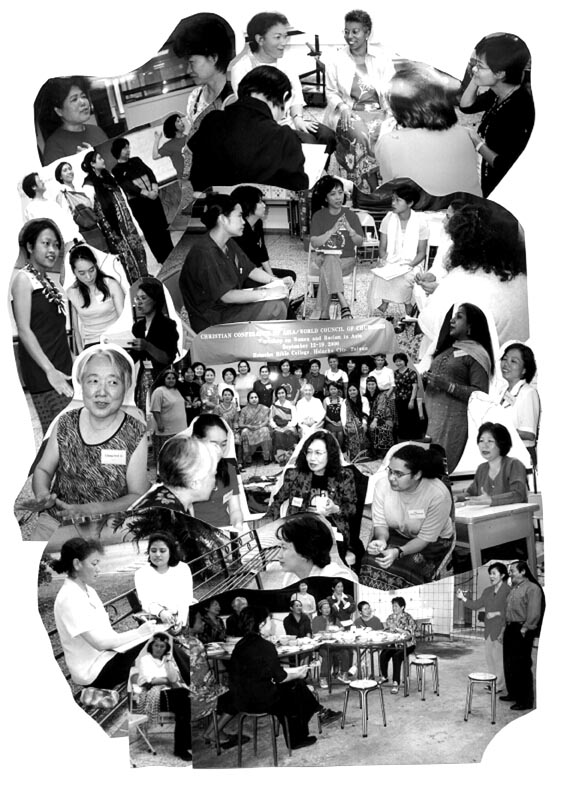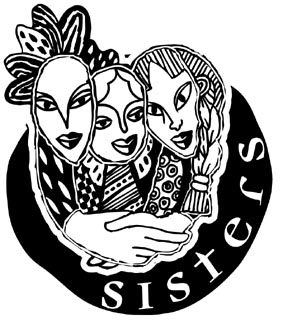
Church women’s role in overcoming racial discrimination...

|
Church women’s role in overcoming racial discrimination... |
 Photomontage by Corazon Tabing-Reyes |
... in Asia was the theme of a regional workshop organised at Hsinchu Bible College, Hsinchu City, Taiwan from 12-19 September 2000. Planned in partnership by the Christian Conference of Asia (CCA) Women’s Desk and the WCC’s Urban and Rural Mission (URM) and Women Under Racism (WUR) programmes along with the WCC SISTERS network, the workshop gathered twenty women from Indigenous and Ethnic minority communities from churches around Asia involved in working to overcome Indigenous-Aboriginal/Ethnic Minority discrimination in their own countries. As an ecumenical space of encounter for women, the workshop encouraged the participants to share their life experiences and individual struggles, and fostered solidarity bonding for networking and further work on common priorities. A better understanding of the situation of Indigenous-Aboriginal and Ethnic Minority women in the region was achieved via a comparison between different countries - with presentations on Maori in Aotearoa/New Zealand, Aboriginals in Australia, Ainu and Koreans in Japan, Tibal taya, Hsinchua taya, Pinyin, Amis, Pumas in Taiwan, Philipino migrants in Hong Kong, the Chinese minority in Indonesia, Moros and Cordillera Peoples in the Philippines, Aos in India, minority Christians in Pakistan - as well as presentations on particular themes. The presentations highlighted issues related to people’s identity, culture, language and education:
The SISTERS identified three priority areas for action: 2. Networking/Alliance Building aimed at developing, expanding and strengthening networks/alliances among church groups and Indigenous/ Ethnic Minority groups in the various countries and in Asia through information-sharing. 3. Creating an alliance of Indigenous and Ethnic Minority women at local and national levels. Towards that goal, SISTERS will organise forums of women leaders, individuals and victims, and work to strengthen the existing organisations and alliances.
Methodologies: Monitoring and evaluation mechanisms were also identified. While identifying their own specific roles in carrying out their priorities, the SISTERS called for the continued support of the CCA and the WCC in monitoring and responding to the concerns of Indigenous and Ethnic Minority women.
Asian Women’s Declaration against Racism
We are women from churches and Indigenous/
Ethnic Minority communities in Australia, Aotearoa/New Zealand, Hong Kong, Indonesia, India, Pakistan, the Philippines, Japan and South Korea, and Taiwan. We gathered at Hsinchu Bible College, Hsinchu City, Taiwan from September 12-19, 2000 for a workshop on Women and Racism in Asia. The workshop was organised by the Christian Conference of Asia and the World Council of Churches.
We have come together in the spirit of solidarity and friendship to worship, study the Bible, and share our experiences, reflections and analysis of discrimination because of our race, ethnic background, gender, or economic status, and explore ways to combat racism and discrimination.
The worship and Bible studies on the theme enlightened and inspired us. We worked in a fully participatory and empowering way, enabling us to express ourselves creatively. We had the opportunity to be with Aboriginal women in Taiwan and to worship in their churches.
We have listened with pain and outrage to stories of suffering, despair and struggle of Aboriginal women such as the Ainu, Maori, Naga, Moro, and Tayal, Haka, Saiseat, Indigenous Australians, migrant workers and other church women from marginalised communities. We also remembered the other women who were not able to come, the Dalits and the women from Myanmar and their oppression from the caste and political systems they are in.
From these stories we realised the similarities of women’s oppression. Her story is also my story, our experiences are one and the same:
We affirm the rights of all peoples to life, health, education, employment, prosperity, and security. We affirm the right of women and Indigenous Peoples to cultural expression, to participation in decision-making, to chart their own destiny, to liberation from the triple burden of race, class and gender, and to participate in the creation of a just, sustainable and peaceful society.
We commit ourselves to work together to break the barriers of religion, ethnicity, race, gender, class and all forms of discrimination that divide communities. We stand united and speak with one voice against all forms of discrimination and violence against women and minority groups in society; recover our cultural identities and enrich community life with our unique contributions; promote human rights, human dignity and human fellowship; and work for peace and reconciliation;
We commit ourselves to bring the issue of racism and the concerns of women and Indigenous Peoples to the attention of the churches and urge them to act in the light of the Gospel.
We commit to keep the memory of this gathering alive in our hearts through the work we will do in our own churches and communities, and through our continuing interaction and friendship. All these we offer in prayer to God, Source of the breath of life.
Hsinchu, 18 September 2000 |
| SISTERS in Latin America
Bible and theology, gender, identity and class are key words for a SISTERS two-year training programme designed by and for Black and Indigenous women in Latin America.
A resource group made up of Elza Tamez from Costa Rica, Silvia Regina de Lima Silva from Brazil/Costa Rica and Maria do Carmo Moreira Lima from Brazil/Costa Rica, Nidia Fonseca from Venezuela/Costa Rica1, Margarita de la Torre of the Indigenous Centre for Theological Studies in Ecuador, Ana Maria Vargas from ISEAT, Bolivia, and Marilia Schüller from Brasil, of the WCC’s Programme to Combat Racism, and led by Senia Pilco of the Latin American Council of Churches’ (CLAI) Service to the Family, Women and Children met in San José, Costa Rica 3-4 August 2000 to design the programme as a follow-up to a workshop on Theological Perspectives of Black and Indigenous Peoples, held in Matanza, Cuba, in May 1999.
The two-year training programme aims to equip a group of twenty Black and Indigenous women with skills to read the Bible from gender, identity and class perspectives, using Historias de Vida (life stories) as a methodological tool. Exclusion and marginalisation are the main hermeneutical keys. | |
 |
The first three five-day modules (2001-2002) will address gender, ethnic/racial identity, class and power respectively, while a fourth module will deal with Transversalidad, the links between the previous three modules. The training will take place in Bolivia, the Dominican Republic, Guatemala and Brazil - countries with large African-Descent and Indigenous populations. Selection criteria, determined by CLAI’s Service to the Family, Women and Children, stipulate that participants should be directly connected to a local group of women, and be ready to act as multipliers on their return to their own local churches/communities. |